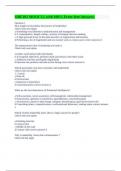OBE102 MOOC3 || with 100% Error-free Answers.
Question 1
How might we best define the practice of leadership?
Check only one option
a Something very different to administration and management
b A contemplative, largely solitary, process of strategic decision-making
c A high-powered focus on the meta-narrative of organisation and business
d Performing a lot of fragmented and non-routine work at a heavy pace correct answers d
The interpersonal roles of leadership are used to:
Check only one option
a Gather, send and provide information
b Accomplish objectives, perform rituals and interact with other teams
c Authorise activities and handle negotiations
d Innovate new products and take action during crisis correct answers b
Which personality trait most correlates with leadership?
Check only one option
point
a None do
b Extraversion
c Openness to Experience
d Concientiousness correct answers a
What are the four dimensions of Emotional Intelligence?
a Self-awareness, social-awareness, self-managment, relationship management
b Extraversion, openness to experience, agreeableness, conscientiousness
c Assertiveness, desire to take charge, energetic determination, goal-driven hard-work
d Controlling others, competitiveness, confrontational behaviour, seeking status correct answers
a
Which of these leadership styles shows a high concern for people?
Check only one option
a Initiating structure
b Laissez-faire
c Middle-of-the-road
d Country club correct answers d
Why is leadership "more than commonsense' ?
Check all that apply
,a It can result in passivity in followers - an interpretation of a world in which some are born to
lead and others born to follow
b Most of the long-term ideas about leadership have scientifically been proven to be wrong
c The common sense view of leadership tends over-emphasise charisma, willpower and a clear
and rational thought process
d It often leads to a distorted picture of reality ,in which leaders are hereos guiding lesser mortals
through the travails of organisational strategy and excution correct answers a,c,d
Why can it be difficult to pursue Evidence-Based Leadership?
Check all that apply
a Businesses are characterized by the belief that the particulars of their organization are special
and unique
b It can threaten managers' personal freedom to run their organizations as they see fit.
c Research evidence is not the central focus of study for many business students, MBAs, or
executive education programs
d Leadership is the natural preserve of great people, not something that can be taught or
developed correct answers a,b,c
If you were to design a perfect leader, what qualities would they have?
Check only one option
point
a High cognitive ability and deep integrity
b High extraversion, moderate agreeableness, openness to experience and conscientiousness
c There are too many contradictory models of leadership qualities to be able to pursue such a
task
d A high need for power, a moderate need for achievement and a low need for affiliation correct
answers c
Question 4
If you had a colleague exhibiting counter-productive emotionality in the workplace, what could
you do in response?
Check only one option
point
a Nothing - I have a task-orientated leadership style and such emotionality is indicative of
somebody who is the wrong fit
b Tell the person to take an extended break from work to recover
c Confront them and tell them such emotional behaviours are letting the team down and failing to
support my leadership
d Use EQ skills to understand and manage my own reactions to the emotionality and help the
person better manage it him or herself correct answers d
What best defines people with a high Need for Achievement?
Check only one option
, a They are reluctant to play the bad-guy role
b They seek close relationships, desire to be like others, enjoy social activities and seek to belong
c They like influencing others and seek positions of authority
d They are goal oriented, take moderate risks, desire concrete feedback and work hard correct
answers d
Henry Mintzberg was the first person to empirically research the day-to-day activities undertaken
by a CEO. What best defines his findings?
Check only one option
a CEOs were special people who are able to strategically plan years into the future and deal with
long-term time horizons despite short-term pressures
b Although there were many CEOS, very few actually displayed the styles and qualities of
leadership identified in academic literature
c High cognitive ability and deep integrity
d CEOs were the source of the organisational vision, entrusted with the provision of purpose,
values and motivation in the workers
e CEOs have to perform a multiplicity of interdependent roles in fast-paced, fragmented,
regularly interrupted environments correct answers e
What types of leadership does behavioural research ultimately support?
Check all that apply
a It doesn't support any single leadership style, suggesting there is no one best leadership style in
all situations
b Democratic, people-centered, consideration and concern for people
c Autocratic, job-centred, initiating structures and concern for production
d Co-leadership, in which one leader is production-oriented and one is people-oriented correct
answers a,d
Question 8
If the Pygmalion Effect is accurate, which leadership attitude becomes problematic?
Check only one option
a Self-efficacy as people will stop believing in their capacity to do the tasks
b Theory Z as people will become too attached to their teammates to focus on work
c Theory X, as treating people like they are lazy and dislike work will result in them becoming
lazy, disliking work and performing less effectively
d Theory Y as they will become so content at being treated well they'll lose the motivation to
work hard correct answers c
Question 9
Why do so many extroverts seem to get into leadership positions?





